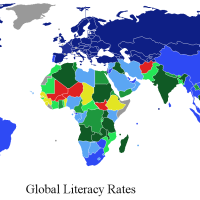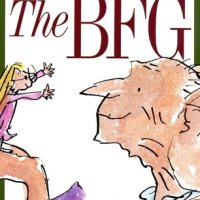I’m really excited about my new blog! I’m no longer updating this one, so please head on over to elizabethsyson.wordpress.com and hit that lovely “follow” button to keep hearing about my adventures.
I’ve got a countdown until my departure for Rwanda, and I hope you’ll come along as I join the Peace Corps and dive into teaching English!
Tag Archives: blogging
I’m Moving!
Blank Page Phobia

If there’s a trope in the writer world more cliche than “It was a dark and stormy night…” it’s the terror of the blank page.
We all face it—the emptiness like a white-out blizzard that might swallow us and numb us until the terror turns to frozen death—the fear we try not to acknowledge, hiding behind funny writer jokes and declarations of how much we adore creating worlds out of graphemes.
I face it when I sit down to the first daunting word of an assignment and when I open a document for a new story. I face it two paragraphs in, when the rest of the page stretches like the wilderness at the crumbled end of an abandoned sidewalk. I face it when I open a new blog post like this one and wonder yet again if I have anything to write that’s worth posting.
The world is full of shouting voices. The internet is a veritable sea of people waving their arms and shouting, “Over here! Hey! I’m right here!” and “Can you hear me? Can you hear me now?” And somewhere, in the midst of that, in a world where 6.7 million people blog on blogging sites alone and and somewhere between 600 thousand and a million books are published each year in just the US—somewhere, buried in the noise and the chaos, each of us hopes to be heard.

That blank-page-phobia isn’t really about coming up with the right words. It isn’t “What if I have nothing to say?”
It’s “What if nobody cares?”
Our greatest fear isn’t of being silent, but of being silenced.
We fear obscurity. We fear redundancy. We fear the “so what?” factor—that the words we feel to be so intimately a part of us will be met with apathy if we open them to the world.
We are portrayed time and again as a selfish culture—all of us, whether as a country or as a generation—but the truth is that we don’t shout for attention because we’re narcissists. We shout because we’re desperately lonely. In a world where all of us plead for attention, most of our voices mingle into unintelligible noise.
As writers, we’re told to churn out material constantly. The most oft-repeated advice I’ve heard is, “Write every day.” Write because practice makes perfect. Write because the more pieces you put out, the more likely one or two of them will float to the top of the pile and gain notice.
Write. Write. Write.
And I stare at the blank page and tell myself to write, and a small voice inside me whispers, “But what if nobody reads it?”
So today, I give you and me permission not to write.
To set the blank page aside and listen to one or two of the other voices screaming into the void. Today, let’s take the time to let some other lonely soul know that their voice is heard—that their words are not white noise—that the confessions of their heart are not redundant, not worthless.
And then, when we’ve done that, I give you and me permission to write.
To craft sentences and select words and make typos and finish—or not finish. To publish—or to not publish. I give us permission to write because we are writers and because the craft itself is a worthwhile endeavour. And I give us permission to love our writing even if nobody else reads it, to set our words aside if they do not contribute to the clamour of voices—or to lay our souls before the world, knowing that the act itself is meaningful, no matter the result.
Because none of us is silent. None of us is obscure. None of us is redundant. No matter how many voices drown us out, each of us matters.

Chronicle of…what now?
“Blog about what you know best,” said the expert at the writing conference.
And I thought, “Fear. I know fear. I feel it daily. It drives everyone I know. And maybe, just maybe, writing a blog about it will force me to face my fears and grow as a person. What a great opportunity!”
And thus was born my blog.
The concept was simple: blog once a week about a fear I faced. Learn from it.
The practice was…well, less simple.
It turns out fears aren’t as exciting as they sound. They’re not scaly, fire-breathing monsters to be slain and sung of in ballads. They’re mundane things. I’m afraid of apologising. Of meeting people. Of packing and resting and getting out of bed for class. (And of bees. I haven’t faced that fear yet.)
And the more I write, the more I realise something: I don’t want to write about fear. Looking back through my blog posts the other day while trying (in vain, so far) to get organised, I saw that my posts began as a commentary on my fears and gradually grew into the story of my search for beauty. Here’s the thing—fear is everywhere. Everyone is frightened of something, and dwelling on my fear hasn’t helped me deal with it. Maybe I’ve learnt to identify it, to recognise its legitimacy, to admit to it, but I haven’t learnt to live past it. But when I stop looking at what frightens me and focus instead on something that excites, engages, enlightens–then I can move beyond the panic under my ribs and the shaking in my hands.
Overcoming terror isn’t about identifying it; it’s about finding something more meaningful and focusing on that.
The rain glistening on skyscrapers in a crowded city.
The impossible red coating the underbelly of a maple leaf on a Monday morning.
The scent of coffee drifting through the office during a meeting.
Sunlight throwing tiny rainbows through the window after an exam.
Because beauty trumps fear every time.
So this week, here’s my fear: I’m afraid of change and I’m afraid to commit. And this week, I’m committing to change.
I’m changing my focus.
It’s time to stop studying what scares me and start searching for what excites me. And will I still talk about fear? Most definitely—as a foil for the small, bright beauties I find everywhere. The breathtaking moments, the subtle pleasures, the unexpected smiles.
Because the world doesn’t need more fear. It needs more beauty.
What Belly Fat Has To Do With Blogging
I have a confession.
Sometimes…I cheat.
Sometimes when my Chrome plugin that keeps me from wasting time says, “You’ve wasted too much time on Facebook today; get off for 24 hours,” I get on Safari instead, and I keep wasting time.
One problem: on Chrome, I have an ad-blocker plugin. On Safari, I don’t. This means that on Safari, I get to see all the irritating-slash-creepy ads that say things like, “There’s a new law in your town!” or “There are single adults near you!” (Spoiler: I live at a university. Of course there are single adults near me.)
Last night, the creepy ad said, “Five foods women should never eat! Cut belly fat by avoiding these foods!”
And I got angry.
Because nobody’s going around telling men they should cut belly fat by skipping out on yummy food. Because nobody should be allowed to judge my belly fat, thank you very much. Because skipping out on perfectly good food is a horrible way to lose weight. Because why does the internet get to tell me what my body size should be anyway?
I was tempted, in retaliation, to quit exercising and start eating funnel cakes for every meal, to gain some belly fat and keep it.

I quickly realised this would not accomplish much, so instead I did a scary thing. When Amy Green asked if I’d write responses for her blog’s feminism discussion this month, I said yes.
Here’s the thing: I get roaring furious about feminist issues. I’ve always had what you might call an overblown sense of justice. As a kid, I threw fits if my brother’s slice of pie was a fraction of a millimetre larger than mine. If everyone’s sharing a bag of chips and one person eats faster than the rest, it kills me that the fast person ultimately gets the most chips, even if everyone gets the same amount of enjoyment out of eating them.
Arguments also drive me crazy–especially arguments that matter–because there are always at least two sides to any issue, and I have a talent for seeing them. This makes me hesitant to make strong statements about big issues, because I’m probably wrong about something or underestimating something or misjudging something. And if I’m not, someone probably thinks I am, and that’s as bad, because I despise being judged as narrow-minded.
I also hate feeling helpless.
Guess what? Feminism is all those things. It’s injustice that infuriates me, and it’s huge, multifaceted injustice that I cannot personally solve. So I try to avoid it.
Let me make another confession: for a long time, I was that person who said, “Stop complaining. Sexism is not a thing. Quit making a big issue out of nothing.” In some ways, I think I was sheltered. Because my own family is egalitarian, because I myself can’t fathom discriminating based on something as petty as gender, because my gender has never held me back in my short life–I was certain the rest of the world must be as fair as my own small circle.
Over the past few years, I have become increasingly aware that it is not.
So this week, I am speaking up. I am saying things people may not agree with, things people may not like, because I believe them to be relevant, essential, and true. I’m saying them because I am a woman and a writer, and I should stand up for rightness.
More than that–because I am a human, and I should stand up for humanity and decency and the chance that maybe saying something will open someone’s eyes, change someone’s world, shift someone’s paradigm just the tiniest bit.
Because a strange man in a parking lot told me to smile, because a hundred blogs demand my clothing coincide with a man’s desires and not my own comfort, and because the internet wants me not to eat because I might have belly fat.
Easy Ways to Survive Writing a Novel
My memory extends back as far as, oh, about two minutes ago. And it’s J-Term, so I have no routine. And I never know what day of the week it is.
Actually, I can’t remember how many weeks it’s been since I wrote a blog post.
(I have a really great one worked up — it’s all about pottery and clay and how I’m a perfectionist and totally terrified that I’ll make things explode in the kiln — but I’m saving it for next week, when all the pieces come out of their last firing and I know for certain whether anything of mine blew up or not.)
No blog posts does not mean no writing. I’ve been writing a lot, and it’s been terrifying, and I’m going to tell you about it…
See, I tried doing NaNoWriMo this year, and last year, and the year before…and you know what? November is a horrible month. November is Thanksgiving and final projects; it’s last-minute Christmas plans and last-minute registration; it’s reworking my four-year plan for the fifth time in two years. I gave up on NaNo because I spend the whole month feeling guilty–guilty for not writing whenever I’m doing other things, and guilty for not doing other things whenever I’m writing. It’s a lose-lose situation.
But January is J-Term, and J-Term is only two classes and almost no homework; it’s too cold to go outside and too quiet to be distracted. J-Term is endless pots of tea and supportive friends who do things like researching chemistry for me so I don’t overdose my characters and reading my awful first drafts and still telling me to be a writer. This is the J-Term of Actually Submitting Essays and of Resubmitting Rejected Things.
And it’s the J-Term of monomaniacally writing 50,000 words of a novel. This is a scary experience, but a few things are helping:
First of all, tea. Tea is not just about “oh Elizabeth is an addict.” (I am.) Tea is about putting your mind in a place that knows it’s writing a thing. Dieticians say (I know, because a dietician said to my mother) that if you build up a habit of eating something at a specific time or during a specific activity, you always feel hungry at that specific time or during that specific activity. Conversely, specific foods can make you think it’s time for a specific activity, like how that one spicy candle scent always smells like your grandma’s kitchen at Christmastime. I have taught my brain that when I sit down with whole pot of tea, it means it’s time to write a whole lot of words. This is not a guaranteed Writer’s-Block-Away, but it’s a definite help. (As a bonus, sipping at tea while staring intently at the last sentence you wrote improves your Wise Writer Appearance and looks impressive.)
Second, Scrivener. I guess this isn’t really a tip of any kind, but I’m excited about it. I got the free trial over the summer, and I ran out of my free trial last week and bought the full programme. As an organisationally-challenged visual planner, it’s a lifesaver. It allows me to see my whole novel at a glance, to know where I’m going, to see tangibly how long or short the space is between an element’s introduction and climax. Plus, having spent money on it, I now feel compelled to use it regularly to make it worth the investment.
Third, attraction. Now, this can backfire, as I discovered. I’m spiralling into a depression because my favourite character is fictional and therefore not in my life, and I had to stop writing and go to bed the other night because I felt so guilty over breaking his wrist that I couldn’t focus. On the plus side, though, the more attracted I am to my characters, the more I want to write about them. When cranking out 50,000 words in a month, it helps if you want to be writing. And if you’re attracted enough to your character to want to write about him, you might also want to spend a while stalking celebrities scouring the internet for a playby–someone who looks similar. Snag a photo, keep it with your story, stare into your character’s beautiful eyes glance at it for inspiration when you’re not sure what your character would say or do at any point.
Fourth, prioritising–otherwise referred to as “stopping trying to change all the things before the whole draft is done.” Every time I start working, I remember some detail that will be important later and hasn’t been brought in yet. I remember some character who’s going to die and isn’t yet likeable enough to make the readers grieve. I notice that I called it a “wrought iron fence” in the first chapter and a “cement wall” in the sixth. I realise that Alex’s tell–the one Helen mentions a lot but never expounds on–only actually happens once. I realise I’ve mentioned Helen’s hair in every chapter and never said that Alex is blonde. But…I don’t fix these. Instead, I use the wonderful comments feature and leave a note to myself. “At some point, this needs to become important.” “Maybe we could make this consistent. Later.” “The second draft should probably include this way earlier.” And then I move on. It’s really hard to get words written when you’re busy trying to tweak other words. And a novel is kinda like one of those connect-the-dots pictures–until you’re finished connecting all the dots, it’s hard to know which lines you should have curved which direction. So I’m leaving the lines alone till the whole picture is done.
Fifth–no deadline. This is a personal project. I gave myself a goal to see if I could meet it. I told myself to finish during January because I have time during January, and in February I will not have time. But if I don’t finish by the end of January, nothing horrible will happen. I will not have an irate publisher or professor sending me angry emails or marking me down. My goal is 50,000 words by the end of January. If I get 40,000 done–or only 20,000 done–that’s still 40,000 or 20,000 more than I had at the end of December, and it’s still an accomplishment. Turns out I like soft deadlines. Not feeling panicked about the impending cutoff date clears my mind to think, to create, to critique. Turns out it’s easier to write when you don’t feel guilty.
Maybe I’m not a genius, and maybe you were hoping for a much deeper blog post–and maybe you’re a writer who’s feeling guilty about not working on a project, and today you needed me to give you permission to drink tea and search for playby photos instead of cranking out another few hundred agonising words.
I give you permission.
In fact, come by. I’ll make a pot of tea, and we’ll drink it together.
On Value and Advance Payment
Confession: Big writing jobs scare the living daylights out of me.
But you’re a professional writing major! I hear you say. You shouldn’t be afraid of writing–you should LOVE big writing jobs!

“You post pictures of typewriters,” you say. “You should not fear writing.” But oh, the secrets typewriter photos can hide…
Seems like, huh? But I’m petrified. And yesterday, I smiled and nodded and kept my hands from shaking while I accepted two flashdrives and a sheet of paper detailing the biggest job I’ve ever received.
And that started me asking some questions. See, I’ve done plenty “real” writing jobs. Articles for writing periodicals, devotionals for a kids’ book–pieces I’ve signed contracts for. (Which is another terror we can talk about later; contracts are scary!) But this piece feels different. Bigger. More important.
Why?
Probably two reasons: I received an advance for it, and it’s longer than three pages.
Don’t laugh, because I’m dead serious. Just holding that advance payment in my hand started a series of shudders down my spine, because, Oh heavens these people are paying me and they haven’t even seen my work and what if I ruin this and what if I miss my deadline and what if I spend the money and then they demand it back and I don’t have it and I ruin my career forever and…
You get the picture. And see, I’m not usually terrified of writing jobs. (Okay, if they include interviews, I am. Interviews are scarier than contracts.) Usually, I’m only terrified of my own writing, because there’s the possibility of my spending years on it and then finding that no publisher wants it. At least when I’m handed a writing job, I know that someone wants the material.
But this is a Very Big Job, I remind myself. A Very Important Job.
And that’s when I realised: I’m devaluing.
See, when people say, “What do you write?” I’ve come up with an answer, finally: “I want to affirm the value of the individual.” An abstract, lofty concept, but one that I see more and more in my writing. And here I am, devaluing readers subconsciously by ranking my writing as “important” or “not so important” or (heaven forbid, but it happens) “Meh. I can whip this out in half an hour the night it’s due.”
Writing advice always includes one point: Know your reader.
And if I write for my reader, calling one piece more important than another really comes down to placing value on my readers. “This is important. These readers deserve my best–I hope my best is good enough for these important readers!” or “These readers don’t matter much; this piece isn’t that important. These readers will be satisfied with mediocre work.” Or (heaven forbid, but it happens) “These readers couldn’t matter less to me. I’ll pop this out and maybe proofread, but I doubt they’ll even care about that, because they are not important readers.”
….wow. What an arrogant perspective! How dare I class one reader lower than another? Don’t they all deserve my best? Don’t my blog readers deserve the effort I put into my highest-paying commissions? Don’t kids reading devotionals deserve the same care and attention I pay to literary magazine subscribers?
I thought that advance-payment cheque represented my greatest fear this week, but I was wrong. Advance payment for a big job is terrifying, but recognising my own nature is worse.
Today, I thought I feared failure, but I don’t–I fear my own arrogance.
Edge of Blackness
This is the edge of blackness – the dividing line between the light and the shadows. Here, with this post, I leave my world of sunlight, where I can see, predict, and control everything, and I enter a realm of shadowy unfamiliarity.
I was told to write about what I know best.
I know fear best.
This is my stand against it. From behind my keyboard, one tiny terror at a time, I will live courageously.
I will only post when I have faced a fear.
Today I faced a giant: today I created a blog. The voices of fear hounded me through every keystroke and tap of the trackpad:
You have nothing to say.
Nobody will read your blog.
You should do something worthwhile.
Fear is like that. It hisses from beside and behind me, but I refuse to be guided by its whispers. Because I have a calling. I have a soul and a passion and a voice, and I cannot live another day giving in to the fear that drives me.

For those of you brave souls who have never felt fear, this is how it feels: like being alone with no landmarks in sight.
So this is my stand.
Because God gave me a spirit, not of fear, but of power, love, and a sound mind.
(On second thought, scratch the ‘sound mind’ bit of that. I’ll plead the fifth on that point.)
Because fear can’t stand opposition.
Because I have been freed and must walk in that freedom.
And every time I face a terror, no matter how small, I press the shadows back.
So this is me, then, choosing to do the things that knot my stomach and constrict my throat and crush my ribcage with anxiety.
And this is you, whoever you are, wherever you are, holding me accountable, because as long as someone’s watching to see if I do it, I might be able to muster through the first stumbling, wobbly steps on sheer bravado.


















